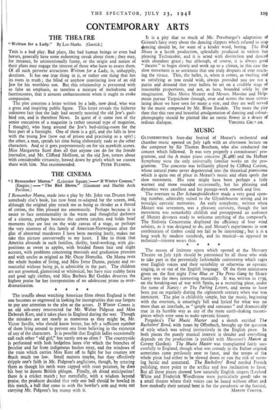MUSIC
GLYNDEBOURNE'S four-day festival of Mozart's orchestral and chamber music opened on July 14th with an afternoon lecture on the composer by Sir Thomas Beecham, who also conducted the concert which followed. It was very properly a connoisseurs' pro- gramme, and the A major piano concerto (K.4138) and the Haffner Symphony were the only universally familiar works on the pro- gramme. The concerto was brilliantly played by Clifford Curzon, whose natural piano never degenerated into the theatrical pianissimo which is quite out of place in Mozart's music and often spoils the slow movement. His tone might have been perhaps a little warmer and more rounded occasionally, but his phrasing and dynamics were excellent and his passage-work smooth and free.
The overture to Der Schauspieldirektor made a very good open- ing number, admirably suited to the Glyndebourne setting and its nostalgic operatic memories. An early symphony, written when Mozart was seventeen, was a pleasant curiosity, though the last movement was remarkably childish and presupposed an audience of Mozart devotees ready to welcome anything of the composer's. The Sinfonia Concertante displayed the efficiency of four wind soloists, as it was designed to do, and Mozart's experiments in new combination. of timbre could not fail to be interesting ; but it is a long work by modern standards, and its musical—as opposed to technical—interest wears thin.
* * * *
The season of intimate opera which opened at the Mercury Theatre on July 15th should be patronised by all those who wish to take part in the perennially fashionable controversy which rages over English voices and their suitability or otherwise to operatic singing, in or out of the English language. Of the three miniatures given on the first night True Blue or The Press Gang by Henry Carey was the most interesting musically. It was written in 1739, on the breaking-out of war with Spain, as a recruiting piece, under the name of Nancy : or The Parting Lovers, and seems to have been put on regularly during the eighteenth century when war was imminent. The plot is childishly simple, but the music, beginning' with the overture, is amazingly full and lyrical for what was no more than an interlude, as " simple and sensuous " and dramatically' true in its humble way as any of the more earth-shaking master pieces which were soon to make operatic history.
Pergolesi's The Music Master and a sketch entitled The Bachelors' Bond, with tunes by Offenbach, brought up the question of style which was solved instinctively in the English piece. In both pieces the purely musical interest is slender and everything depends on the production (a parallel with Massenet's Menon at Covent Garden). The Music Master was transplanted fairly suc- cessfully to England, though what was comedy in the Italian original, sometimes came perilously near to farce, and the tempo of the, whole piece had either to be slowed down or run the risk of seem- ing hectic and unnatural. The Bachelor? Bond needed French polishing, more point to the artifice and less inclination to farce.'
But all three pieces showed how naturally English singers (Leyland White and Frederick Woodhouse were particularly good) take to a small theatre-where their voices can be heard withont effort and how markedly their natural bent is for the paradostic or the farcical,
MARTIN C.00PER.


































 Previous page
Previous page